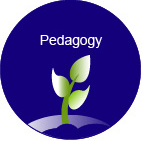This spring, I taught a technology course for pre-service teachers. In addition to my MLS, I have a master’s degree in educational technology, a graduated certificate in online teaching and learning, and an undergraduate degree in education. My own schooling had taught me the importance of making pedagogically sound decisions and never using technology for only the sake of using technology. I quickly learned though that making those pedagogically sound decisions when looking into the eyes of students was a bit more challenging than I had originally thought.

As I reflected on my teaching after every class, I asked myself many questions including: How do we learn? How can I incorporate technology in a way that is beneficial for my students? How can I use technology in a seamless manner where the learning is not interrupted by inclusion of technology?
Once the spring semester ended and I was able to breathe, I started to think about how what I learned teaching a technology course could (and should) influence my work as a librarian. Overall, I think librarians do a pretty great job using technology, but I realized for me that many of the technology decisions I make in my day job as an academic librarian are not nearly as grounded in learning theory as I think they should be. When I was teaching a full course it was easier to think about theory and wrestle with these questions, but when I create libguides, build tutorials, make suggestions for the library website, and recommend new technology for the learning commons, how often do I first think about how we learn?
So here is my goal (I’m admitting it online and hoping the LITA community will support me in it), I want to start reading more books on learning theory and start using that knowledge to influence all aspects of my work, and specifically with the technology that I use since almost everything that I do is somehow connected to technology.
Current reading list:
- Make it Stick
- Understanding by Design
- SoTL Literature (too many books to list)
What do you recommend that I read? Do you have any tips for connecting learning theory to non-teaching library technology responsibilities?
Nathan
Understanding Context by Andrew Hinton
Not Just Where to Click by Troy Swanson
Seven Complex Lessons for Education by Edgar Morin
Situated Cognition volumes; books by Wolff-Michael Roth, Jay Lemke, John Dewey, William James, Gunther Kress
http://www.jaylemke.com/feeling-meaning/
https://ioelondonblog.wordpress.com/
Lauren Hays
Thank you, Nathan! I’ll check these out.–Lauren
kris
Reflective Teaching, Effective Learning: Instructional Literacy for Library Educators
Char Booth
Item Number: 978-0-8389-1052-8